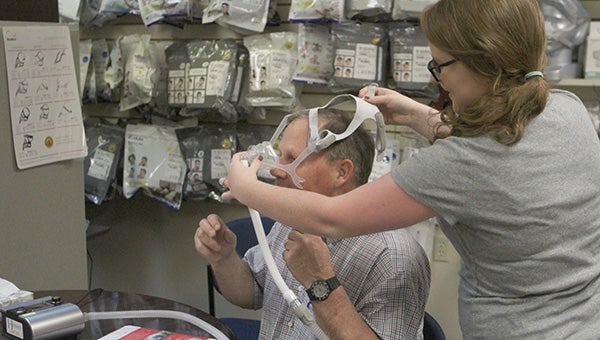Hometown medical provides supplies
Published 10:09 am Wednesday, April 27, 2016

- CPAP: Co-owner of Hometown Medical David Hosemann sits patiently as registered respiratory therapist Lacey Bagley puts a continuous positive airway pressure (CPAP) machine on Hosemann.
Over the last 30 years, Hometown Medical has served Vicksburg and its home health care patients with equipment and supplies.
Hometown Medical stocks its shelves with home medical equipment such as walkers and canes, diabetic footwear and lift chairs, with additional items found on its vast online catalog.
Co-owner David Hosemann –his wife Connie owns the other half – said his job is to help physicians, nurses, hospital discharge planners and insurance companies’ case managers ascertain the right decisions for a patient or customer.
“A high percentage of what we do is with the elderly, what we call the geriatrics marketplace,” Hosemann said. “With the elderly, they have special needs and we recognize them. We’ve had experience over the years at Hometown Medical recognizing those needs.”
The products with a high volume of purchase include ones used to treat sleep disorders, respiratory products, bathroom safety and compression hosiery. Unlike his competitors that offer home delivery, Hometown Medical has an open retail space to display products.
Hosemann has worked in the medical supply field since 1981 and said the biggest change in home care over the past seven years is the regulatory arm of Medicare.
“We’re held under certain regulatory accounting, but we have to fall within delivering the way they want the equipment delivered. That being said, it’s really become a science to understand exactly what they’re looking for.”
What ends up happening to home care companies, due to regulation, is Hosemann educating all the health care team members in the community, which trickle down to the families making the right decisions for their loved ones.
In Hoseman’s opinion, two products have been at the advent of breakthroughs in medical technology.
First is the blood glucose machine.
“When a person can actually take their own blood glucose and tell whether their sugars were up, then they can take control,” Hosemann said. “They don’t need their doctor sitting in their hip pocket and going home with them.”
Next is the role cloud computing plays in generating advanced medical data.
Patients who wear a continuous positive airway pressure (CPAP) while asleep, doctors are able to tell how much rest and other related information a patient received.
“We are already using a lot of technology that is in the cloud for compliance reports, especially with sleep,” Hosemann said. “A lot of the machines that we’re buying now can tell us, in the cloud, whether the patient is actually using it or not, whether there’s compliance there, whether they’re using it properly. That’s the exciting part about this business.”





